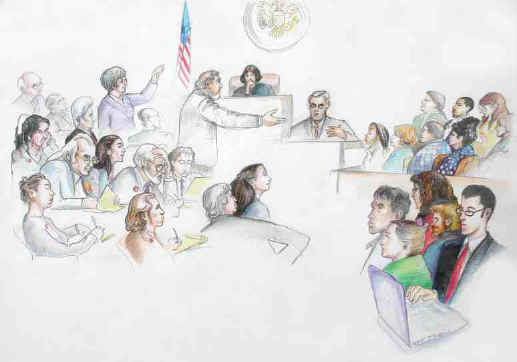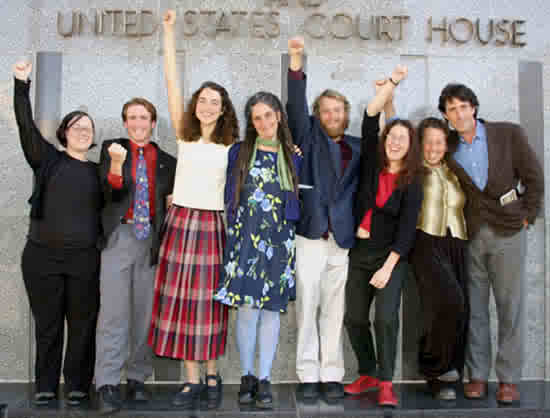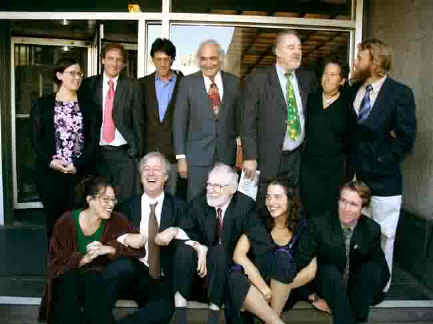Culture Change
e-Letter #94
Pepperspray
via Q-tip, war, ecocide, etc.
A culture of torture: out of
control?
by Jan Lundberg
It is extremely good news, in these days of crises over environmental
devastation, war and diminishing freedoms, that torture by pepperspray-via-Q-tip
was held un-Constitutional on April 28th, 2005. A federal jury in San
Francisco unanimously found that Humboldt County, California Sheriffs had, in
violation of the Fourth Amendment of the Constitution, used unreasonable force on nonviolent, passive protesters.
 Three lock-down sit-ins
were staged in 1997 in the land of coastal
redwood forests. The last major groves of unprotected ancient redwoods were falling
fast. The Headwaters Forest deal –
to save 7,500 acres out of more than
60,000 in one tract, at a huge windfall to the rapacious corporate raider
who had seized Pacific Lumber Company –
was being fought on many levels. Mass
arrests meant that the movement was on the rise.
Three lock-down sit-ins
were staged in 1997 in the land of coastal
redwood forests. The last major groves of unprotected ancient redwoods were falling
fast. The Headwaters Forest deal –
to save 7,500 acres out of more than
60,000 in one tract, at a huge windfall to the rapacious corporate raider
who had seized Pacific Lumber Company –
was being fought on many levels. Mass
arrests meant that the movement was on the rise.
But as the security
chief for the timber company said to the first batch of
protesters to be peppersprayed in his employer's head office, "You have an education coming."
Instead of the usual grinders to unlock the protesters from their heavy steel
sleeves, the Sheriff's Deputies came and announced chemical agents would be used in
five minutes. No negotiations were offered or allowed by the police,
except the choice of unlocking or getting a chemical assault from a spray that
has been implicated in several dozen deaths, mainly of arrestees and prisoners.
A lot of people were to learn something
right then and for years to come, when the protesters would not back down.
The windows of the building were papered over from the inside to stop the public from seeing the torture.
The cries of pain and horror were not heard through to the street. One Q-tip was used for eight eyes with multiple applications while all-male officers held
women close, who weren't going anywhere, by hugging them between, during and after peppersprayings.
Officers with badges and guns manhandled a teenage girl whom they
knew as a leader, smearing her eyes and risking poking an eye when the victim writhed and screamed.
Indeed, it had been her idea, my daughter's idea, for this action on the day when the corporate timber owner Charles Hurwitz of MAXXAM
happened to be on trial for savings-and-loan scams.
Some protesters
unlocked first, as they were worried about their asthma, for example. But the heroic ones who were peppersprayed only unlocked outside,
after being carried out on stretchers, or they were ground out of their
sleeves outside. Despite this poor record for pepperspray intimidation,
the police and claimed it was worthwhile and stuck to their story until being
put in their place by six women and two men in federal court.
This was the third trial, not made
easy for the plaintiffs by the judge. She had not allowed punitive damages for this third
trial, nor did she allow evidence the plaintiffs wanted to show: that the then-attorney general of California had condemned the pepperspraying via Q-tip on
the protesters –
but the defense had told the jury the attorney general had
supported the pepperspraying. Another difficulty the plaintiffs had was
their non-mainstream tendencies as to healing: they used herbs and fasting for their eyes and
to help overcome the ordeal, which went against their case in the minds of jurors perhaps, because there wasn't the usual medical approach
(and resulting records) to deal with possible injury and suffering.
I learned of this victory for
peaceful protest at the very time I was attending a teach-in on opposing
state-sponsored torture, presented by the University of California,
Berkeley. I was incredulous and almost overjoyed at the news. However, I did
not have a sense of the political system righting itself. This essay
attempts to place the torture of the forest-defender plaintiffs, as well as
the torture of foreign targets in the War Of Terror, into the perspective of
the need for culture change. Also discussed in this essay is the
culture of torture and some of the factors involved in desperate, atrocious
behavior. I conclude that another world is possible and probable if humanity is to survive.
As a father of one of the eight plaintiffs, and being friends with the
other seven, I am as delighted as all get out for them and for the precedent
achieved. Some folks have lamented
or derided the
lack of compensation to the plaintiffs, but worse is the news media spin that
the outcome was a mixed decision because of the lack of heavy money damages.
(The plaintiffs were awarded one dollar each.) As the
plaintiffs had sought to settle this case for years without personal
compensation, the case is now in the history books as a complete victory.
The plaintiffs hung together for almost eight years, although losing one of
their active number after the first trial and having to get a new legal team.
Dennis Cunningham led the successful team and was complemented by Tony Serra, Bob Bloom
and Bill Simpich before the jury.

courtroom art by K. Rudin
The losing side claims the fact that major money was not awarded to the
victims means the torture was not torture. As the violence-prone local
version of government, Humboldt County, anticipates getting a fat legal bill for the sins of the
law enforcers, it is hoped by those who did not side with the protesters that
a victory for the Defense can somehow be seized if the legal damage –
beyond
the roughly half million already wasted by the county –
can be avoided.
When I lived in Humboldt, a county employee told me after the pepperspray
incidents that the lead lawyer defending the police and the county, Nancy
Delaney, had a teenage daughter and that she (Delaney) had big misgivings over
what was done to the teenage protesters. The next bit of scuttlebutt on
her was that she had profited so handsomely from this litigation that she was
able to put the daughter through college.
I had held a press conference on police brutality against forest defenders
in October of 1996, and had spoken some days prior to the then-Sheriff, Dennis
Lewis. I told him that he needed to know what his people were doing to
the nonviolent protesters. He responded that it was in reaction to
violence against officers. I told him it was a crock. Almost a
decade later he was a defendant saying there had never been
violence by protesters.
As to our rights, the main issue is what the police may do next –
not just
in Humboldt but anywhere in the U.S.!: "We're not going to do a practice that is just going to put us back in
court," [current Sheriff] Philp said last week. Thank you, Sheriff. Analyzing
that, however, one should question clinging to the idea of needing a court to decide what is decent to do to people.
And, the statement seems to pretend there was not a major rebuke that if in Japanese society he would
resign. Nevertheless, he made a sensible and comforting remark here.
He was the former chief deputy who advocated and oversaw the pepperspray
policy under Lewis; Philp won election against his boss a few years ago –
partly because Lewis had gone too far against forest defenders in the eyes of
the community.
One juror said many of the jurors felt that the jury instructions given by
Judge Illston pushed them toward granting only nominal damages. Some of
them believed the police witnesses who said pepper spray caused only temporary
discomfort rather than the excruciating, extreme pain that plaintiffs
testified to. However, a former police chief of Minneapolis testified
for the plaintiffs and told the court forthrightly that the pepperspraying of
these protesters was "police brutality," and he was identified as
persuasive to the jury.

photo by Nicholas Wilson, Sept. 2004
There may be an appeal on the entire case. "Sheriff's
Department Spokesperson Brenda Gainey said a decision on whether to appeal
hasn't been thoroughly discussed yet, as determination on the plaintiff's
legal fees hasn't been made." [reporter Daniel Mintz, Humboldt County's
premier newsman, writing in The Independent and the McKinleyville
Press]. The possibility of the County and Sheriffs
appealing was also dealt with in an interview on the popular and activist
community radio station KMUD in southern Humboldt, on April 29:
"Spring (Lundberg) said the jury verdict –
'a resounding yes, it is
excessive force' –
is very important for preserving the public's rights against
police misconduct. She called for public opposition to any appeal by Humboldt."
This motivates the citizenry to try to rein in the already out-of-step local
government. A Eureka Reporter internet poll put the ratio of
opposition-support of the pepperspraying at 2-1. The citizens of
Humboldt County are more active than most parts of the U.S., having, for example, made
their region a Nuclear Free Zone many years ago. When people start agitating to stop
any appeal of this recent civil rights ruling on pepperspraying, the pressure will carry weight
in the court of public opinion.
Daniel Mintz reported that the protesters were found to
have gone "too far" (by locking down while trespassing). Instead, it
may be going "too far" to say the jury felt the protesters went too far.
The majority of the jurors wanted to give damages to the plaintiffs.
But, as Dennis Cunningham said, some jurors must have found the protesters'
action "extreme" and thereby did not deserve payment, he surmised
about some jurors.
To nail the police for brutality was the main
point accomplished, so a compromise for the sake of taxpayer dollars, among
other reasons, was made. This allowed a minority of jurors to get fully on board to
stand up for civil disobedience. There was some feeling by the
minority of jurors that the pepperspray experience was not so terrible, but it's not like
they said the protesters had it coming – that notion, and that the protesters went too far, is what the
second jury's minority of two
claimed when there was a hung jury last September.
There is a basic distinction that some observers of protests don't grasp, partly because
they may not be close to the movement: Violence is very different from
trespass or even property destruction. Earth First!ers have never hurt a human – hurting a human, animal, or a rare
ancient tree, is violence. The protesters' entry into Pacific Lumber's office was not "violent"; they walked in and were methodical, leaning toward boisterous, but not aggressive.
One reporter told me off the record that the protesters had "...behave(d) violently – via forcible invasion of workplace territory..."
This is a serious misconception that can, in some cases, lead to real violence such as what the police
did to the Pepperspray Eight.
Culture of violence and fear
In any overpopulated society, there is going to be strife,
usually over land somehow. Therefore, there must be some laws and
regulations to keep the peace. It should not be surprising that we are
increasingly treated like
animals in pens, because we are animals. And it's logical that there
will be police, jails, and other institutions such as college and corporate
employers to keep people under control and busy. When the police do their jobs they will
make mistakes. That is what happened here. But this mistake was deliberately rationalized, so it was not
like a mistake of spilling
noxious chemical on somebody's face by accident. Yet, the guilty parties
in this case were indeed trying to do their jobs, and they had a lot of people
behind them to ensure the taming of protesters.
When you own property and for whatever reason you call the police about a
trespass, the cop comes simply to get the "visitors" out, so for the
cop to be always nice about it is not what anyone can rationally expect.
The police have a procedure to get tougher with people under arrest (or not
yet under arrest) that escalates as conditions are supposed to warrant.
Yet, in opposition to the tendency to blindly respect property rights even when the public interest
is on the line, civil disobedience has a role: despite its risks and lack of
universal support, civil disobedience still part of the nation's legal tradition. More
importantly, as we protest the destruction of our environment and local
economies, we must bring everyone on to the bandwagon of both defending the
ancient trees and standing up for human rights.
However, can anyone expect real peace or any progress with protecting the environment
as long as the overpopulation is suffocating the rest of life? It is a
losing game if one tries to make the too-many rats in a cage behave calmly and
kindly.
When we activists and disaffected
planetary citizens look at the whole world, we know it is mostly terribly wrong.
It has gotten to the point that one’s soul can feel bereft or adrift without a
rudder, although everything seems almost the same – there are still flowers,
dinners, love, etc. Protesters who lock down and make a difference
are the real leaders, and they know that a cultural revolution
is necessary to restore our souls as well as save the old forests.
A culture out of control
While torture and other fear-producing tactics are more common than the
citizenry wants to acknowledge and must be stopped
if possible, it is important to put the issue into larger
context. We should not be distracted by endless details of mere events and characters
playing their roles. Just as a war – the ultimate instrument of terror – keeps people occupied or distracted so that power can stay consolidated
where it is, and strategic resources can be seized, other human-rights
situations and environmental destruction take our minds off the reality that
society is being led out of control.
From an anthropological standpoint, a competing band of primates staged the
sit-ins for the redwoods to challenge the dominant gang in an attempt to take
back some power. Of course, the kind of power sought was of a different sort
than the power wielded by pro-corporate-timber functionaries who serve to maintain the land grabs and the repression
that began in Humboldt County about a century and a half ago.
But should we be grateful the timber corporados/sheriffs gang did not use
more violence? It is controlling that the protesters were nonviolent and
were not trying to steal anything, although the lumber and monetary wealth are
ill-gotten gains from the clearcutting, as the current District Attorney
claims
in an historic lawsuit on fraud against Pacific Lumber.

Arms locked in solidarity before the trial
That which should be the commons, where people and other creatures share the
land, has become a private tree-harvesting goliath that spreads diesel all
over the debris left over from clearcutting, then burns it, then douses
carcinogenic herbicides on the barren landscapes in hopes of creating a
monocrop of commercial same-age timber in a few decades. Those
downstream, whether human or salmon, suffer from poisoned water and floods
caused by erosion. The battle for the land goes on before the state
water board, the courts, and in the trees where protesters perch months on
end.
Significantly, the very culture that protesters are up against, marked
by unsustainable use of nonrenewable resources and by lack of both family cohesion
and close community, is usually emulated somewhat by protesters in their private
lives. Additionally, most occasional protesters buy into not just the consumer
culture but in propping up the political status quo, such as by campaigning to
vote for the
lesser of two evils – as if that were the point of conscious politics.
From what I know of the Pepperspray Eight, they are most aware of their own
life-choices in terms of ecological impact, and they pursue fundamental
political and cultural change with spiritual gusto.
What hasn't been discussed in the news reports of this case – and
editorials have been mostly lacking altogether after this successful trial – is the bravery and sacrifice of these young people.
Let us examine why it is it that only
a tiny portion of the nation's population seems to care about our fast-eroding
common future enough to endure arrest and physical pain.
One reason is that the average person know ridicule, stigma or force and punishment await our
stepping out of line. Even though the average American juror
automatically believes the police against citizens – unless there is
uncontestable video as in the pepperspray torture in Humboldt – people know that the
police and military have weapons to control us. They get to call the
shots, as it were. People remember that unarmed students were slaughtered by
National Guardsmen in May 1970 at Jackson and Kent State Colleges. Those
activists had to be intimidated, even killed, so thought the enforcers of law
n' order, because the activists opposed the fear campaigns waged by the
Republican and Democratic regimes.
Today's college students are not the avant-garde of social change that they were back in the 1960s.
However, vestiges and pockets remain, resurrected in such struggles as at a liberal bastion of West Coast
hypocrisy, Santa Cruz and its university campus. On April 19, 2005, UC officials "sent 30 cops to strangle, drag, and arrest nonviolent Tent University students for unlawful assembly."
Nonviolent protests over university workers' wages and the plight of the homeless, some of whom are students at the campus, were part of an ongoing dialogue with the university management.
Without a resolution or agreement with the administration, ninety people were locked on the ground in the wee hours that night and 19 were arrested most painfully.
Seventeen of those were students, and what an education they got – pepperspray not included (thanks probably to the lawsuit by the Pepperspray Eight).
The experience of the activists during negotiations before, during and since was "Double-speak and police brutality," according to a report in
Street Spirit published by the American Friends Service Committee.
Empire of torture
 If
flag waving Americans want to dismiss Abu Ghraib and do not want to think of
the U.S. as a torturer, what is the use of napalm about – used not just in
Vietnam but on Fallujah last fall? And, is not depleted uranium – strewn about
Iraq, Afghanistan and the Balkans – torture and genocide? Of course the
U.S. does some nice things and not everyone in the government is a
torturer. Overall, though, the purpose is not to go do nice things for
other countries but to control them by force for the sake of private financial
interests that control the U.S. government. Perhaps the best description
of U.S. foreign imperial policy is in a song by the late Phil Ochs:
"We're the Cops of the World."
If
flag waving Americans want to dismiss Abu Ghraib and do not want to think of
the U.S. as a torturer, what is the use of napalm about – used not just in
Vietnam but on Fallujah last fall? And, is not depleted uranium – strewn about
Iraq, Afghanistan and the Balkans – torture and genocide? Of course the
U.S. does some nice things and not everyone in the government is a
torturer. Overall, though, the purpose is not to go do nice things for
other countries but to control them by force for the sake of private financial
interests that control the U.S. government. Perhaps the best description
of U.S. foreign imperial policy is in a song by the late Phil Ochs:
"We're the Cops of the World."
During and after the pepperspray trial in April there were two major conferences on
torture. One, at a church near downtown Berkeley on April 22-23,
featured Lynn Stewart the convicted lawyer defending a Muslim man in U.S.
court, and Cynthia McKinney, Congresswoman from Georgia. McKinney
remarked to the audience, "What kind of resistance are we willing to
do?"
 The UC Berkeley torture teach-in during April 28-30 was
sponsored principally by Dr. L. Ling-chi Wang of
the university's Ethnic Studies Department, and featured such panelists as an El
Salvadorean survivor of death-squad torturers, an American Civil Liberties
Union attorney named Lucas
Guttentag who is suing Donald Rumsfeld for torture, and Terry Karl, Stanford
Political Science Professor who is an expert on U.S.-inspired Latin American Torture.
The UC Berkeley torture teach-in during April 28-30 was
sponsored principally by Dr. L. Ling-chi Wang of
the university's Ethnic Studies Department, and featured such panelists as an El
Salvadorean survivor of death-squad torturers, an American Civil Liberties
Union attorney named Lucas
Guttentag who is suing Donald Rumsfeld for torture, and Terry Karl, Stanford
Political Science Professor who is an expert on U.S.-inspired Latin American Torture.
Listening to these experts, and as we savor the victory of the Pepperspray
Eight, one might think the torturers are on the
run. Some foreign torturers have been caught and prosecuted in the U.S., and it became unsafe for Pinochet to
visit the UK and Spain for his crimes. Lucas Guttentag described a
"cascade of justice," from above and below, as international
treaties (from above) and court actions (below) put pressure on criminals both
foreign and domestic who are trying to hide from international law and the
U.S. Constitution. As the pepperspray torture case involves domestic
issues and U.S. citizens, it can be thought of as a new dimension to go with
the from-above and from-below: from within. As much as a reform
movement may wish to clean U.S. house, torture – domestic and outside our borders – is part of maintaining the economic
structure and financial Establishment, as I told Mr. Guttentag and Prof.s Karl
and Wang.
Present system = belief in torture and war. "New" system
= nature
Far more than fighting for a cleaner but same-old system, we need to consider changing political systems, or rejecting systems in favor of living as close to nature as possible.
Nature is the only system there is, and any competing system doesn't last long.
The mainstream U.S. consumer seems to buy into the economic-growth system without a care, despite enormous costs on various levels.
Buying a gadget that we can do without, at Walmart for example, means importing
– via petroleum – something made of polluting materials; the gadget was made with severely exploited labor with little environmental safeguard; Walmart is anti-union and sexist, and,
lastly, one should buy locally produced items for the sake of sustainability and jobs instead of DRIVING to a huge parking lot that destroyed a wetland.
Walmart, does, however, have very low prices, so as consumers we sell ourselves down the river for a few coins.
The issue of torture goes to what kind of system we maintain or tolerate.
The believers in the present economic system tend to accept most things about the system, including torture, wars, paving the planet,
ad nauseam. Count me out. Another world is possible and probable if
humanity is to survive.
- Oakland, California, May 5, 2005
*****
Listen to an interview on the
pepperspray torture trial. These three short victim/lawyer interviews, recorded in mid April in San
Francisco, with Depavers music as finale, on the
Steppin' Out of Babylon show, by Jan Lundberg, are at http://www.suesupriano.com/audio/pepperspraydepavers.mp3 (fast
connection needed for large download)
See prior reportage on the pepperspray case in Culture Change
at
http://culturechange.org/issue15/pepperspray.html
Contribute to the Pepperspray Eight's court costs, through the
Trees Foundation:
https://www.treesfoundation.org/donations/donate-43
Listen to Daughter Spring at the Depavers webpage, http://www.culturechange.org/depavers.html
(scroll down to Daughter Spring and click on hyper link for f.m. quality
download of this eco-rock duet between father and activist).
KMUD radio program on verdict:
http://www.nopepperspray.org/audio/050429_kmud_verdict_spring_dennis_juror_conni.mp3
Courtroom art by K. Rudin at http://nopepperspray.org/rudin.htm
Redwood forest picture from the Headwaters Grove, courtesy
EPIC:
http://www.wildcalifornia.org/
"Fear:
A political tool" – article by
Ghali Hassan
http://onlinejournal.com/Commentary/050305Hassan/050305hassan.html
Street Spirit tabloid monthly: http://www.thestreetspirit.org
May 2005 issue, page 7 headline: "Nonviolent Students Brutalized at
UC Santa Cru" by Becky Johnson
To support the nonprofit Culture
Change and its projects, make a donation.
To recommend Culturechange mailing list to a friend, send them this link: